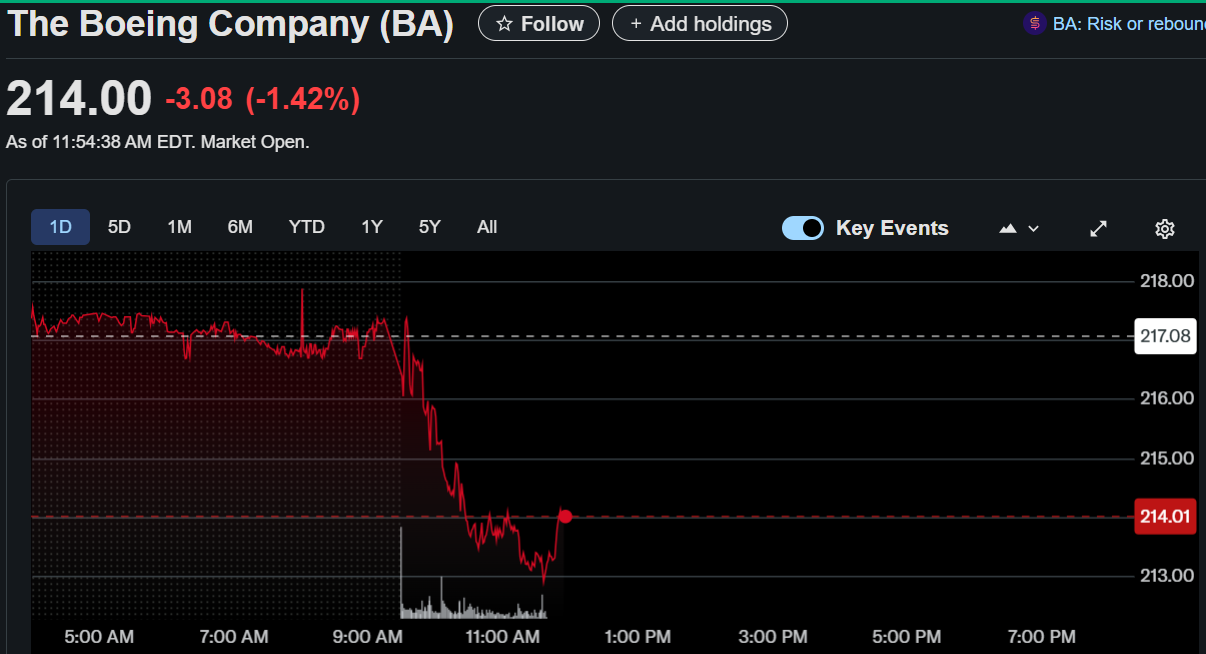TLDR
- Boeing eyes 737 MAX successor as shares dip 1.8% amid production woes
- Boeing starts work on new jet while FAA eases rules, stock slips 1.8%
- Boeing launches 737 MAX replacement effort; investors show concern
- Boeing’s new narrowbody project stirs market jitters, shares down 1.8%
- Boeing pivots to next-gen jet as FAA restores limits, stock declines
Boeing(BA) shares traded at $213.18, reflecting a drop of $3.90 or 1.80% by mid-morning Tuesday.

The decline followed reports that Boeing has initiated early development of a new single-aisle aircraft to succeed the 737 MAX. The move comes amid persistent regulatory scrutiny, delayed certifications, and intensified focus on production quality.
New Aircraft Project Marks Strategic Shift
Boeing has begun initial work on a new narrowbody aircraft aimed at eventually replacing the 737 MAX. The planemaker has reportedly started designing the flight deck and evaluating new propulsion systems for the model. Discussions with Rolls-Royce took place earlier this year regarding a potential new engine for the aircraft.
Boeing has not publicly confirmed the design or timeline for the 737 MAX replacement. However, CEO Kelly Ortberg has reshaped leadership within the commercial division to focus on next-generation aircraft. The new product lead, who has prior experience launching new designs, is spearheading the internal efforts.
The successor aircraft project signals a shift in Boeing’s long-term strategy. The company appears to be prioritizing innovation in the narrowbody segment. This is seen as a move to maintain market share against Airbus, particularly in light of the ongoing challenges with the 737 MAX.
FAA Restores Limited Authority Amid Production Issues
The Federal Aviation Administration has reinstated Boeing’s authority to issue airworthiness certificates for some 737 MAX and 787 jets. This update takes effect starting September 29, 2025, following a pause imposed after the second MAX crash in 2019. The FAA had previously withheld this power due to safety and compliance concerns.
Boeing continues to face challenges in meeting regulatory expectations. Ortberg recently acknowledged delays in certifying the new 777-9 widebody aircraft. He stated that completing the process will require significant additional work.
Boeing’s production constraints persist. The 737 MAX output remains capped at 38 aircraft per month. This limit was imposed following a serious safety incident involving a door plug on a MAX 9 earlier this year.
Stock Performance Reflects Market Concerns
Boeing has shown sensitivity to recent developments surrounding production and certification delays. Market participants appear to be factoring in long-term investment costs and short-term execution risks.
While the replacement project suggests strategic intent, it brings uncertainty over timelines and certification hurdles. The company must also address internal quality control to stabilize operations. These operational challenges have weighed on Boeing’s financial outlook since the MAX grounding.
The 737 MAX re-entered service in late 2020 after a 20-month grounding following two fatal crashes. That crisis triggered lawsuits, regulatory reforms, and a loss of public trust in the aircraft. Boeing has since taken steps to restore compliance and rebuild credibility with global aviation authorities.






